Peter MALONE
Saturday, 18 September 2021 19:56
King is Dancing, The/ Le Roi Danse
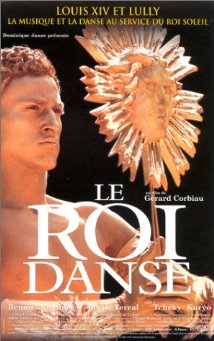
THE KING IS DANCING/ LE ROI DANSE
Belgium, 2000, 115 minutes,.Colour.
Benoit Magimel, Boris Terral, Tcheky Karyo, Colette Emmanuelle.
Directed by Gerard Corbiau.
This is the third film about music from Belgian director Gerard Corbiau. He also made The Music Teacher and Farinelli. This time the focus is on the French composer Jean-Baptiste? Lully. The other central characters of the film are King Louis XIV and the dramatist Moliere. The film traces the interaction between the three characters, their mutual support, devotion, falling out.
There is a great deal of Lully's music, especially the ballets and the eagerness of the young Louis XIV to be a dancer. There are also the collaborations with Moliere, especially on Tartuffe. However, Tartuffe is condemned by the right-wing Catholics as well as the conservative nobles and the occasion is taken to condemn Lully for his dissolute and bisexual life.
The film recreates the atmosphere of the court of Louis XIV with great detail, shades of light and darkness, elaborate costumes and décor. Benoit Magimel, winner of awards for his role in The Piano Teacher at Cannes, portrays Louis XIV. Boris Terral is Lully himself. Character actor Tcheky Karyo portrays Moliere.
While the film gives some insight into the period, it also portrays a genius set in his historical context, with his personal and professional struggles.
Other films of the 1990s which portray the music and art of the 18th century include All the Mornings of the World, Ridicule and, especially, Marquise, where Moliere and Racine are characters.
1. The films of the director, his interest in music, opera, dance, theatre?
2. Audience response to the world of Louis XIV, the Sun King, his background, his father and the kingdom, artistic legacy? The long reign of Louis XIV, his building up of France, the developments of Versailles? His being a patron of the arts, of the theatre, music? The film suggesting his love for and skills in dancing?
3. The recreation of the period, the 17th century, the lavish court, costumes and decor, the vistas of Versailles, the gardens, the Palace and the interiors? The audience immersed in the era of Louis XIV?
4. Jean-Baptiste? Lully, his Italian origins, his personality, his musical compositions, his place in the court, his relationships, bisexuality? His relationship with Louis XIV, infatuation with him? His compositions, skills, musicians? The interactions with Moliere? Moods, temperament, achievement? This collaboration on The Bourgeois Gentleman?
5. The character of Moliere, his talent, is place, performance, influence of the King? The fact that there were many other playwrights during the reign of Louis XIV, Racine, Corneille?
6. The King, his personality, his age, ambitions, achievement? The interactions of France, divine right? His relationships? The influence of Anne Austria? Reactions to his mother? The influence of his mother’s entourage?
7. His personal relationships, marital, extramarital? Madame Montespan, a sense of his isolation, even loneliness? The building of Versailles? The fostering of Lully and his music? Promoting Moliere? The discussions with the composers and playwrights?
8. The title of the film, the focus on Louis and his dancing, and ambition, his skills, what it meant to him?
9. The people in court, men and women, the many courtiers, their lives, work, gossip, relationships? The historical figures, Colbert, Conti, and the politicians and diplomats?
10. The baroque style of the film – bringing to life a baroque era?
Published in Movie Reviews
Published in
Movie Reviews
Tagged under
Saturday, 18 September 2021 19:56
Zero Motivation
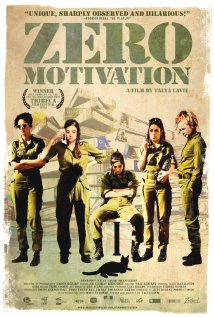
ZERO MOTIVATION
Israel, 2014, 97 minutes, Colour.
Dana Igvy, Nelly Tagar, Shani Klein.
Directed by Talya Lavie.
Some commentators have suggested that while motivation is appropriate the title of the film in translation, the original Hebrew is better translated as “people skills”. This describes the three central characters. People skills are not their forte.
This is an Israeli multi-award-winning film, was written and directed by a woman and has women as the main characters, a film about women, their personalities, interactions, and how the Israeli Army deals with women, especially in administrative roles.
This may make the film sound much more serious than it is. In fact, it is a comedy, with an ironic, very often sardonic treatment, with some slapstick moments – and with quite some pathos.
The film consists of three stories: the first is called The Replacement, the second is The Virgin and the third, The Commander. The first story is about a young woman who arrives at the base and is seen by Daffi, who works in the office, in charge of shredding papers, as the replacement she has been writing to officials about, for her anxiously-sought move to Tel Aviv. In fact, the new girl is an impostor, not detected by any of the guards or the authorities, who is really coming to the base to make contact with the soldier that she had met earlier and with whom she is infatuated. Quite a lot of complications, rather to the detriment of the soldier in the film’s criticism men and the exploitation of women.
Another key character is Rama, the female officer who heads the administrative bureau, demanding, lacking people skills, impossibly bossy, who imposes her moods and commands on the girls who spend a lot of time trying to avoid her or defy her.
The second story focuses on Zohar, tough girl, with more than a touch of what people call “attitude”. She doesn’t want to be in the army, whiles a lot of time away, is friendly with Daffi but has impeded the request for her transfer to Tel Aviv. With Daffi moved to officer training, Zohar is left alone to think about herself, especially sexual relationships – with a rather sobering experience with a visiting paratrooper who turns out to be certainly not the man of her dreams, but who is completely humiliated by Irena, who takes up Zohar’s support. There is a climactic moment when she is commanded by Rama to tidy the office – and does so in a shredding spree.
The third story has Daffi back after her officer training, still dreaming of Tel Aviv but transferred back to the base to take Rama’s place. The tension between Zohar and Daffi reaches a height, including a battle in the office with each having a staple gun and firing and Daffi making quite a mess with the computers.
Obviously, this film will make an impact on Israeli audiences, especially with their experience of military national service and its consequences – audiences around the world will observe with a mixture of humour and wondering what the long-term consequences will be for the characters caught up in this military service.
1. An Israeli film? Serious? Humorous? Universal applications?
2. Israeli military bases, the desert, the officers, offices, administration, training, authorities?
3. A women’s film, writing and direction, central characters, women’s issues, women in the Israeli Army? The comments on men, authorities, soldiers? Sexual relationships, exploitation? Sardonic? Ironic? Funny?
4. The three stories, the women, Daffi and Zohar and the cycle?
5. The Replacement: the women on the bus, coming back after the weekend, Daffi, a reluctance to return, all her applications for a transfer to Tel Aviv, Zohar waiting for her, friendship? Their personalities? The new girl, the discussions, taking her round, the work? The daily routine unfolding, the officers and their meeting, the coffee, late, Runner and her anger? Each of the different girls in the office? The two singing, Irena and her Russian background? The details of the work, petty work, the officer in charge of shredding?
6. The replacement girl, eager, going to the room to her boyfriend, his having another woman in his bed, her intruding, the declaration of love, his being taken aback, the desperation, his putting her off? The discovery of the other woman? Going back and gruesomely killing herself? Reactions?
7. Zohar’s story, as a virgin, in herself, her work, the two years national service, lazy, playing competitive games on the computer, breaking records? The friendship with Daffi? The discovery that she had not sent her many letters to the authorities, Daffi explanations of the letters to Rama, wanting a transfer? Zoahr not wanting her to go? Her going to the officers’ course? Zoahr, preoccupations about sex, training to be on guard, the breaking of the bed, Irena going into the dead girl’s bed, experience, the issue of the ghost? The office work, checking the details of the documents, Rama telling Zohar to take Irena to the infirmary? Not going? Zohar, being on guard, bailing up the paratrooper, the discussions, his going to the canteen, the date for the following night, Zoahr going, the other girls coming to the table, and Zohar going to the ladies’ room, his waiting for her? The rough sex? Irena, the gun, making the paratrooper strip, with the garbage bin? The return, Rama making her clean up the office, the next morning, everything clean – and all the shredded paper in Rama’s office, her immersion in the shredded paper?
8. Daffi, training to be an officer, the hardships with the physical demands? At the base, Rama canvassing a promotion, not getting it? The farewell party, the cake, her speech interrupted? Daffi, the interview for the job, back to the base, her weeping? Taking Rama’s place, the routines, the coffee? Zohar ignoring her, playing the games on the computer? Daffi, desperate, trying to delete the games from the computer? The computer expert and the digitising of all the documents? His losing material because of Daffi? Copies of all her letters on the notice boards? The two girls and the cell, the fight with the staple guns? Daffi going to Tel Aviv, ambition fulfilled? Zoahr remaining at the base, the reconciliation, friendship?
Published in Movie Reviews
Published in
Movie Reviews
Tagged under
Saturday, 18 September 2021 19:56
Mr Magoo
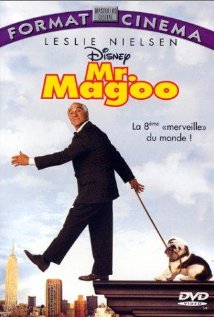
MR MAGOO
US, 1997, 87 minutes, Colour.
Leslie Nielsen, Kelly Lynch, Matt Keeslar, Nick Chinlund, Stephen Tobolowsky, Ernie Hudson, Jennifer Garner, Malcolm Mc Dowell, Miguel Ferrer.
Directed by Stanley Tong.
Mr Magoo was a famous cartoon figure, featured in a number of short films, with the voice of Jim Bacchus giving a characteristic tone to Mr Magoo and a number of phrases, Mr Magoo, you have done it again!
With the decision to make a live-action version of Mr Magoo, the makers have opted for making it a live-action cartoon. Perhaps an obvious choice for Mr Magoo was Leslie Nielsen who made the transition from serious actor to being a regular standby for movie spoofs, Repossessed, Wrongfully Accused, The Naked Gun series. He captures all the characteristics of Mr Magoo and gives credibility to what is basically quite implausible.
One of the wise thing is that the film does is to have the opening credits featuring the cartoon character himself, getting himself into all kinds of bother, a victim of his nearsightedness and his presumption that there is nothing wrong with his eyesight. After the credits, the film makes an easy transition to the live-action. And, to cap it off, the film goes back into animation for the final credits.
The basic plot is a familiar one of a precious jewel put on display with arch criminals determined to steal it, Kelly Lynch, obviously enjoying her role as a femme fatale, unscrupulous, martial arts expert, and Nick Chinlund the victim of all kinds of pratfalls. They are to bring the stolen Stalin jewel to arch-criminal, sculptor and auctioneer to the world’s greatest villains, a brief cameo by Malcolm Mc Dowell.
Mr Magoo is invited to the exhibition and meets a young woman who is in charge of the Kuristan delegation (Jennifer Garner looking, in hindsight, remarkably young) while his young bumbling, destined to be a new Mr Magoo (Matt Keeslar) is immediately infatuated
Mr Magoo makes all kinds of mistakes at the reception, is seen at the scene of the crime (which is quite an elaborate show), bumbling into a closet with a mini exhibit and thinking that a mummy is a patient needing an ambulance. In come the CIA and the FBI in the forms of Ernie Hudson and Stephen Tobolowsky. Hudson is ambitious to solve the case, write a book and become famous. Tobolowsky is a victim, all the way through all kinds of mishaps, mayhem and what is literally, knockabout comedy.
Everything goes wrong at a benefit with operatic excerpts and the femme fatale makes a date to interview Mr Magoo, who, unbeknownst, has the jewel when it fell into his fishing tackle box as the two thieves fought on a ferry. At home, Mr Magoo plays catch with the jewel and his British-looking bulldog. The criminals search his home as do the authorities while Mr Magoo is in the kitchen cooking with the help of a television program and accidentally changes channels with the comic consequences.
In a strange twist, the authorities persuaded Mr Magoo to impersonate a sinister Brazilian criminal who wants the jewel – with Mr Magoo going to Brazil with his nephew, following the femme fatale as well is the bumbling thief, the authorities following on. The episode is a wedding, with Mr Magoo extraordinarily finishing up disguised as the bride and getting the jewel back.
The film is good-natured while being very silly, plenty of slapstick to amuse slapstick lovers, a touch of nostalgia for older audiences who remembers the cartoons from their childhood days.
Published in Movie Reviews
Published in
Movie Reviews
Tagged under
Saturday, 18 September 2021 19:56
Tangerines/ Mandarlinin
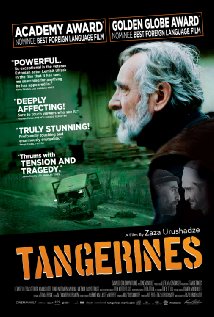
TANGERINES/ MANDARLINID
Georgia/Estonia, 2014, 87 minutes, Colour.
Lembit Ulfsak, Elmo Nuganen, Girogi Nakashidze, Misha Keshkhi.
Directed by Zaza Urushadze.
A fine film.
Tangerines is translated in the subtitle as clementines, while listening to the dialogue and looking at the fruit in the orchards, there is reference to mandarins. No matter what the actual translation, the abundant fruit in the orchard, its fruitfulness, the fact that it needs to be picked and collected, offering food for nourishment, and the fear that if it is not picked, it will perish, means that tangerines is an evocative symbol for this film.
Audiences may wonder about the connection between Estonia and Georgia and the film as a co-production. As we wonder about this, the pre-credits inform us that there were colonies of Estonians in the Caucasus, in Georgia, living and working in peace. But, at the outbreak of war between Georgia and Akhbasia in 1992, most of the Estonians went back to their homeland leaving empty villages and houses.
We immediately see an old man, a grandfather, Ivo, working with wood in his workshop, making crates that can be used for the collection of the tangerines. Almost immediately, he is visited by two Chechen mercenaries, Russian-backed mercenaries who are fighting against the Georgians. They want food, treat Ivo well, but warn him of the dangers of the war and that others will not be so kind.
Ivo has an Estonian friend, Margus, who tends the tangerine trees. When a skirmish between Chechens and Georgians leads to deaths outside Ivo’s house, Ivo tends the wounds of Ahmed who had just visited him. As they bury the dead, they discover that one of the Georgians, Nika, is still alive and Ivo and Margus rescue him, calling on an Estonian doctor who treats each soldier equally.
What the film offers is an opportunity to appreciate the people who get caught up in the war, not be any part of its making, who live a simple life, only in indirect contact with the battles, but suffering the consequences, uncertain of what is happening, the times of war when each side is dominant and then overcome. In the uncertainty, what the two Estonian men have two offer is sympathy, healing, some understanding, and the pledge that the two enemies, despite their rivalry, will not kill each other in the house. Gradually, the kindness and dignified bearing of Ivo and his saving the lives of each of the men has quite an impact as they begin to treat each other as human beings rather than as enemies. Ivo hears their stories, as the audience hears them and appreciates the common humanity of each of the men, despite one being a mercenary and the other an actor who has felt an obligation to defend his country.
The cast is small in number, but the key characters are well-delineated, well-written, excellently acted. In fact, the film is beautifully crafted, and, despite some scenes of shooting deaths, a film that pleads for peace.
Audiences, for whom the Caucasus countries may seem remote, will begin to understand traditional communities, that local wars can break out, civil wars – which has happened at various times with different states of Georgia wanting to secede, relying on Russian backing. The film also throws light on what life in the countryside of eastern Ukraine is like with fights for secession, independence.
1. Impact? Humanity? War? Peace?
2. The collaboration between Estonia and Georgia? The history of Estonian settlements in the Caucasus? The work, outbreak of war, leaving for Estonia, those who stayed?
3. The title, the imagery of the mandarins, the many trees, the orchard, fruitful, the need for collection or perish? Margus and his work, his perishing?
4. The focus on the Georgian landscapes, the land, homes, the workshop, the forest, the orchard, the mountains overlooking the water? The musical score? The final song and its meanings?
5. Introduction, Ivo and his working with the wood, making the crates, his age, dignity? Will life in Georgia and feeling part of it?
6. The arrival of the Chechens, the atmosphere of war, mercenaries with banking from Russia? The character of Ahmed? Ibrahim? The treatment of Ivo, getting food, in the house, talk, taking the food – and warning Ivo about dangers?
7. Ivo, his age, family, the photos, his house, workplace? A simple life, the good man, his treatment of the Chechens? His friendship with Margus, going to the orchard, discussing the fruit and the collection? Hopes?
8. The skirmish outside his house, the Chechens clashing with the Georgians, accidents, killings? Ibrahim and his death? Ahmed and his being saved, his wound, in the bed, Ivo and his kind treatment? The burying of the dead, finding Nica aliv, saving him, the severity of his head would?
9. The enmity between the two men, the threats, the hostile talk, Ivo locking the door to protect Nica? Tending him, feeding him, his recovery?
10. The visit of the doctor, his help, with each man? Going back to Estonia?
11. Days passing, the tangerines on the tree, the need for help, Ivo and his picking the fruit? The crates? Too much for him? The promise that pickers would be sent, their not arriving? Aslan and his men, promising, their being killed?
12. Ahmed and Nica in the house, each giving his word not to kill the other? Food, drinking the tea, at the table, hostility, offering to fight, the rivalry about abilities and skills? Becoming calm, the change? Nica going outside, the barbecue, the sharing of the meal, the talk, smiling?
13. Ahmed, Muslim, his prayer, the mercenary, offering some of his pay to Margus, Margus refusing? Ivo urging him to take the money?
14. Nica and his story, an actor, young, going to war despite his mother, sense of obligation? Ivo promising to come to see him in Tiblisi?
15. Aslan and his men, Ivo organising the pretence, their being spared, Aslan and his offer for help in the orchard?
16. The explosion, Margus and his house exploding, being burnt down, his grief?
17. The troops, demanding that Ahmed prove he was Chechen, his vocabulary? The attack, the shooting? Margus and his being killed? Nica getting the guns, firing, saving Ahmed? Nica being killed, the effect on Ahmed, on Ivo?
18. The two men making the coffins, burying the dead, burying Margus? The hill overlooking the water, Ivo telling the story of his son, Nica buried near his
son – and that Ivo would do the same for Ahmed – only a little further away!
19. What was the audience left with, in terms of war, peace, reconciliation, sitting and sharing, the qualities of human nature? Ivo and his toast to death? The film and its message for life?
Published in Movie Reviews
Published in
Movie Reviews
Tagged under
Saturday, 18 September 2021 19:56
Longest Week, The
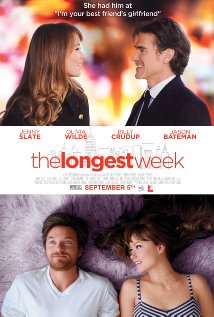
THE LONGEST WEEK
US, 2014, 86 minutes, Colour.
Jason Bateman, Olivia Wilde, Billy Crudup, Tony Roberts, Jenny Slate.
Directed by Peter Glanz.
The Longest Week is a variation on the romantic comedy. It focuses on a wealthy middle-aged man, Conrad, played in his usual satisfying way by Jason Bateman. He has lived his life in luxury and without any responsibilities, supported by his parents. When he is disinherited, he moves in with his best friend, Dylan, Billy Crudup. On the subway, he has encountered an attractive young woman, Beatrice, Olivia Wilde, who suddenly appears with Dylan – and Conrad wins her away from him.
There are seven chapters in the film, for each day of the week, as well as an epilogue. The voice-over is by Larry Pine.
Most of the film shows the relationship between Conrad and Beatrice, their clicking, communicating – although he does not tell her the truth.
Throughout the film there are encounters between Conrad and his psychiatrist, played by veteran Tony Roberts.
Perhaps Conrad does learn something throughout the film, although he is prone to lie to himself and to exploit others. While he does write his novel, he receives his inheritance again and generally returns to his self-indulgent life.
There are many literary and philosophical allusions, classical music, and number of discussions about pretentiousness, something which viewers of this film accused it of.
1. Romantic comedy, variation on the theme? The man of illusions, disillusionment?
2. A New York story, New York City interviews, hotels, apartments, charity benefits, restaurants,
3. The voice-over and its information, effect, tone? Musical score?
4. The title, seven days, their being named, forming chapters of the film?
5. Conrad, his age, experience, hailing taxis at seven, living in luxury, the information for his planned great New York novel, his relationship with women, spoilt? The story of his parents, stranded on the island, the disliking each other, divorce, not wanting to support their son? Ousting from the hotel, no credit, his chauffeur refusing to drive him, the girl waiting, then walking off, not giving him any cash, leaving the dog? His travelling on the subway?
6. His decision, going to his friend, Dylan, the explanation of Dylan as an artist, his relationships, one woman at a time? Dylan taking Conrad in? Persuading him to go to the benefit? Dressing up, Beatrice as Dylan’s friend, Conrad admitting he had met Beatrice, reading Jane Austen, giving him a telephone number? His repetition of the promise to Dylan not to do anything with Beatrice?
7. His going out with Beatrice, the restaurant, talking, the sophistication, literature and culture, the discussions, going for the walk? The dancing, Intercut with the kissing? At home? In bed? The next morning and his having to deal with the relationship?
8. The continued relationship with Beatrice, Conrad not telling the truth, planning to but failing? His satisfaction with the relationship? Communicating with Beatrice? The outings, talk?
9. His discussions with Dylan, the truth, Dylan upset, the gift of the Volvo – and later retracting, then changing his mind? Dylan and the invitation to the theatre, the double date, the performance? Jocelyn, the comments after the play, her studies, pretentious, drinking, going home with Dylan? Leaving? His finding another Jocelyn?
10. The string quartet, Conrad leaving, later seeing Beatrice with Dylan, her explanation that she was trying to patch up the friendship? His over-reaction? Telling the truth about his financial situation?
11. The friendship with his chauffeur, the advice, lending him money? Conrad and his practical helplessness, for instance his laundry?
12. Moving out of Dylan’s house, moving in with Beatrice? Moving out? Taking her to the hotel, the pretence, taking his mother’s jewels, being caught?
13. His not seen Beatrice again? The relationship with Dylan and its development?
14. The constant sessions with his psychiatrist, listening, observations, Conrad deceiving himself even when he was being honest?
15. Trying to phone his mother, the news of their reconciliation, his going back to his comfortable life?
16. His writing his novel, the launch, his reading, the questions, his satisfaction?
17. The voice-over, telling the narrative, making the psychological comments, the moral comments?
Published in Movie Reviews
Published in
Movie Reviews
Tagged under
Saturday, 18 September 2021 19:56
Big Fisherman, The
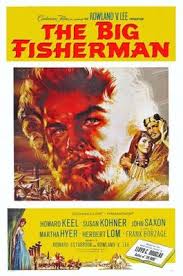
THE BIG FISHERMAN
US, 1959, 180 minutes, Colour.
Howard Keel, Susan Kohner, John Saxon, Martha Hyer, Herbert Lom, Ray Stricklyn, Marian Seldes, Alexander Scourby, Beulah Bondi, Brian Hutton.
Directed by Frank Borzage.
The Big Fisherman or is based on a novel by Lutheran minister and author, Lloyd C. Douglas, is known for Magnificent Obsession, filmed in the 1930s as well is in the 1950s, White Banners, medical story, and, principally, for The Robe, the first Cinemascope film in 1953. Characters from that film and novel were used for its sequel, Demetrius and the Gladiators. Four years later, The Big Fisherman was produced – unfortunately for its commercial success and awards, the same year as Ben Hur which scooped the Oscars pool. The Big Fisherman was nominated for photography and costumes.
It is hard to tell whether the film was a success in its time. It now seems particularly dated, difficult to watch except for the most devout. While it is based on some gospel characters, Peter does not appear until 30 minutes into the film. He is played by Howard Keel who was making the transition from musical star to dramatic actor (later to be capitalised on for Dallas). The supporting cast seems minor – Susan Kohner, who appeared in Imitation of Life (and was to retire from films in 1964 after marrying and bringing up her two sons Paul and Chris Weitz, significant writers and directors in their own right). John Saxon at the beginning of his career is the Arabian prince, with Herbert Lom hamming it up as Herod Antipas and Martha Hyer as Herodias.
The film was directed by Frank Borzage, an actor and director from 1913 to the early 1960s who had a significant Hollywood career.
The film was made in the United States standing in for Galilee and for Arabia. The film takes advantage of its locations to create an atmosphere – although, the Arabian story with which the film opens seems to bear little relationship to the Gospels. However, there is the preaching of John the Baptist at the Jordan, the behaviour of Herod Antipas and his loyalty to Rome as well’s Rome’s criticism of him, and a silhouette presentation of the beheading of John the Baptist.
As regards Jesus, it was a tradition for him not to be seen, merely a white robed arm touching characters. However, a lot of the gospel preaching is presented, in a stern, rather rhetorical manner, with the use of ye olde English language and vocabulary which means that Jesus seems somewhat remote.
While the plot has Peter as a fisherman, listening to Jesus, carrying a baby to him to be healed of blindness, known as a disciple, some interludes with Andrew and John, most of the story is speculation – without any gospel foundation but rather the imagination of Lloyd Douglas.
1. The biblical epic of the 1950s? In comparison with such films as The Robe, Ben Hur?
2. The novels of Lloyd C. Douglas, in the tradition of The Robe? Grounding in the Gospel texts? Not focusing so much on Gospel events as on the words of Jesus? Talking about him and his impact? Imaginative fiction with some characters from the Gospels?
3. The American locations for Galilee and for Arabia? The cities, the deserts, the countryside, palaces and interiors? The musical score?
4. The title, expectations about Peter and his presence in the film? Satisfied? Howard Keel in the central role? The big man, strong character, Fisherman, his life in Galilee, fishing with the other apostles, the storms? His sick mother-in-law? His wife dead? His going to hear Jesus, listening to the sermons? Sceptical, carrying the blind baby and witnessing the cure? As a disciple? Known as such? His friendship with David? The encounter with the Fara, recognising her as a woman, sheltering her, taking her to listen to Jesus, meeting Voldi? The situation with Herod, the threats, Peter rescuing her from killing Herod, planning to take her by boat to Arabia his taking her away at the end, becoming a convert?
5. The opening 30 minutes, the situation in Arabia? Fara, her mother in exile, her mother’s death and explaining that she was the daughter of Herod? The effect on her, wanting revenge? Deran, his petty character, horse riding, jealousy of Voldi, his father, inheritance? Farrar and her love of Voldi, the gift of the horse, riding? Her decision to leave?
6. The kingdom, the King, Herod’s wife and her being discarded, her daughter? Deran and his weak character? Voldi and his strong character? The King, Voldi and the commission to go to find Fara? The death of the King and Deran’s accession?
7. Fara, disguised as a boy, travels, the dangers, rescues? With Peter, his shelter? Her work for Herod, posing as a Greek scholar, the sequence of her learning Greek with her tutor? Readings of prophecies to Herod? The plans? Listening to Jesus, his influence? Not believing? Voldi’s arrival? The plan, going for revenge, Peter taking her? Her return? Deran and his paralysis, Peter curing him? Voldi and his hopes? Self-sacrifice and Fara sailing way with Peter?
8. Deran, weak character, love for Fara, the death of his father, his paralysis, his wanting to be healed, the cure, with his mother, turning against her, his saying he could walk by himself? The pursuit of Voldi? Standing on the cliff, his collapse?
9. Voldi, his father, his place in the kingdom, love for Fara, searching for her, rescue, his helping the Roman Centurion, under house arrest, the friendship, but his escape? The pursuit? Finding Fara, Peter, the return? Confrontation with Deran?
10. The voice of Jesus – formal, abstract, preaching rather than action, his not being seen except for hands touching? The old English vocabulary and phraseology? The impact for a 20th century audience – and the reinforcement of Jesus as belonging to the past, language, the good message but the artificiality of this presentation?
11. The preaching of John the Baptist, Herod, radius against him? The party, the official guests, the silhouette behind the screen, the dance, the beheading of John the Baptist, his head on a dish?
12. The film in comparison with other biblical epics?
Published in Movie Reviews
Published in
Movie Reviews
Tagged under
Saturday, 18 September 2021 19:56
Women He's Undressed, The

THE WOMEN HE’S UNDRESSED
Australia, 2015, 99 minutes, Colour.
Darren Gilshennen, Deborah Kennedy, Louis Alexander.
Directed by Gillian Armstrong.
To be told that this very interesting documentary is about costume designer, Orry- Kelly, may not ring many bells with contemporary audiences – with an exception for those who avidly read all the credits on the films from the golden years of Hollywood, especially those from Warner Brothers. His name occurs regularly during the 1930s and 1940s.
This means that he is of particular interest to film buffs. But, director Gillian Armstrong has opened up Orry- Kelly’s career for Australian audiences. He was from the coastal town of Kiama, south of Sydney, growomg there at the beginning of the 20th century, was awkward at sport yet skilled in following his father’s tradition as a tailor, but more interested in women’s clothes. Off he went to Sydney, to King’s Cross where he started to work as a painter, living in Woolloomooloo and aware of this seedier sides of life in Sydney, while working in a bank. He was keen on theatre and was to appear with one line in a show starring Roy Rene, Mo.
However, off he then went to the United States, living in New York City, becoming involved in musical theatre but, after dropping some of the chorus girls, literally, he felt that he was better suited to stage work and costume design. People began to take notice and he eventually went out to Hollywood, made an impression on Jack Warner, and became, for many years, the top costume designer at Warner Brothers, not without clashes with the boss.
On a personal level, he lived in a relationship with Cary Grant for many years, rather more open about his sexuality than Cary Grant was, or Randolph Scott with whom Cary Grant lived.
Where the film is telling for movie buffs is in the information about the stars that Orry- Kelly dressed with many sequences from the films, especially those of Bette Davis, with explanations of why a particular costumes and design, colours, were chosen to contribute to the drama and its cinematic impact. This continued into the 1940s when he was fired by Warner Brothers, found some work at MGM, including sharing an Oscar for the costume designs for An American in Paris, 1951.
Orry- Kelly had relationship problems, as well as drinking problems, but worked to overcome the latter. And, generally every year, he would go home to visit Australia and his mother. One of the devices the film uses is to have an actor, Darren Gilshennen, playing Orry- Kelly, mainly sitting in a rowing boat, sometimes on the water, sometimes on a studio stage with sea background, using the image of his sailing, paddling, going in circles, venturing out, to dramatise the developments in his life. Actress Deborah Kennedy plays his mother, talking to camera while hanging out the washing in Kiama in his early years, then dressed rather fashionably, sitting at a table, still talking to camera, explaining her son’s success.
In his later years, in the late 1950s and into the 1960s, he won Oscars for costumes for Some Like it Hot, 1959, and Irma La Douce, 1963.
Gillian Armstrong is in no way intrusive as a director. She illustrates Orry- Kelly’s biography. She includes many interviews, from contemporary costume designers like Catherine Martin, Baz Luhrman’s Oscar-winning wife, some Hollywood designers and some of the stars, like Jane Fonda, whom Orry-Kelly? dressed in several films. Women He’s Undressed is quite lavish in the many, many clips which illustrate not only his design, but his intuitions and intelligence behind designs – for the many Hollywood women that he dressed.
1. Orry- Kelly and his Hollywood reputation? Memory forgotten? This film resurrecting it?
2. His having written a memoir, its being suppressed, its being found – and the information, revealing secrets?
3. The device of having the designer sitting in a boat, on the water, with the backdrop, the use of the boat, rowing, the signs to Sydney, to Hollywood? The confusion in this sea of life? Illustrating the development of his life?
4. Kiama, the visuals, the blowhole? The house? His parents, his being considered effeminate, dressing dolls, weak arms? His mother, proper, her continued support, interviews throughout the film, putting out the washing, becoming better dressed, proud of her son? His going to Sydney, working in the bank? Living at Woolloomooloo, the prostitutes, his art in the Toulouse- Lautrec vein, on stage with Roy Rene?
5. Going to the United States, New York City, the Bohemian life, Greenwich village, the openness of morals, sexuality and gender? The theatre? His being in the chorus, dropping the girls? Opting out?
6. His father as a tailor, Orry’s skills? Meeting up with Archie Leach, the film presenting Archie Leach and his background, character, their life together, Archie being an escort, relationships, homosexuality? Changing his name, acting, moving on, separating from Orry? The secrecy of the relationship? Cary Grant and Randolph Scott, the relationship, the gossip, the photos? Carry Grant and his marriage, being normal, the divorce? Marrying Barbara Hutton, the divorce? Marrying Betsy Drake?
7. Orry as a painter, his skills, selling his paintings, the revelation about him through his paintings? Costume design?
8. The connections, with Jack Warner, the 1930s, the clashes with Warner, his job at Warner Brothers, Head of Department, with actresses like Kay Francis, Ruth Chatterton, the long demonstration of his relationship with Bette Davis, from being a starlet, through characters, to being a star, her wanting him? His work, designs, dressing?
9. The range of clips, the explanations, illustration of his work, his style, discussions of character, dressing them for particular sequences?
10. The range of comments, Walter Plunkett and not wanting to share the Oscar, Ann Roth , Her reputation and career, her continued comments and admiration, Catherine Martin, Kim, Michael Wilkinson, Erich Sherman, Jack Warner’s daughter, Jean Mathison and the story of Bill Haynes, Angela Lansbury, Jane Fonda? The indicating of the interviews, the sequences from the films?
11. The personal story, the focusing on Cary Grant and Randolph Scott, their cover, weddings, the discussions about what was normal, in Hollywood? Ari being called up, This is the Army? His work during the war, fired by Jack Warner, dressing Betty Grable?
12. His alcoholism, disappearing and drying out, the relationship with Bob Roberts and his admiration?
13. Being hired by MGM, his successes in the 1950s, Oklahoma, Les Girls and his Oscar, for Marilyn Monroe, Some Like It Hot and another Oscar, Auntie Mame, Gypsy, Irma La Douce and a third Oscar?
14. His living in Hollywood, the Hollywood life, returning frequently to Australia? The comments by June Dally Watkins and the Australian perspective?
15. The film is a tribute to him, rediscovering him, praising his achievement? A portrait, in the United States, homosexuality and relationships? The 21st century perspective?
Published in Movie Reviews
Published in
Movie Reviews
Tagged under
Saturday, 18 September 2021 19:56
Entourage
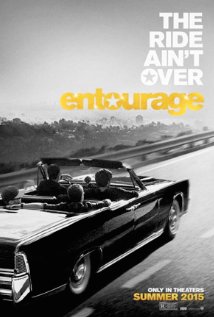
ENTOURAGE
US, 2015, 104 minutes, Colour.
Adrian Grenier, Jeremy Piven, Kevin Connolly, Kevin Dillon, Jerry Ferrara, Emmanuelle Chriqui, Rex Lee, Debbie Maza, Billy Bob Thornton, Haley Joel Osment, Greg Louganis, Alice Eve, Judy Greer, Richard Schiff, Emily Ratajkowski, Piers Morgan, Martin Landau. Cameos: TI, David Arquette, Gary Busey, Jon Favreau, Andrew Dice Clay, Mike Tyson, Pharrell Williams, Liam Neeson, Ed O'Neil, Kelsey Grammar, Chad Lowe, Nora Dunn, Mark Wahlberg, Common, David Spade, Warren Buffett, Jessica Alba, Armie Hammer.
In many ways, it depends whether the audience have been fans of the long-running television series, Entourage, or whether they are coming to it, so to speak, cold. This review comes from the “cold” perspective.
We are told that the movie version begins nine days after the last episode in the series ended in 2011. Which means that the characters may only be nine days older but look four years older. Be that as it may, it seems that the principal characters are all back again. There is Vincent, Adrian Grenier, the film star, having his marriage of nine days dissolved and his machinations not only to star in a blockbuster (which, when we see the opening credits, does not seem to be all that blockbusting) but to direct as well. He is dark and handsome. Then there is his producer, Eric, Kevin Connolly, usually with a rather beatific and youthful smile on his face, which rather belies his ability as a movie producer to deal with agents and money men, and definitely covers over his rather promiscuous attitude towards women, especially his pregnant ex-girlfriend, which seems not only exploitative but misogynistic. There is Turtle, Jerry Ferrara, rather scruffy-looking but wealthy enough, who serves as a friend and chauffeur in the entourage. The last of the group is Jack, Kevin Dillon, Vincent’s older half-brother, an obtuse and crass type, putting his foot in it, continually auditioning to try to get better parts – and not always succeeding.
The powerhouse of the film is fast-talking, wheeler-dealer agent, Ari, played with both infectious and antagonising exuberance by Jeremy Piven. He is certainly the best thing in Entourage.
One of the features of the television series, apparently, is the number of cameos from real stars and celebrities – and it is certainly the case here, some turning up only in passing, but usually in something of a huff or antagonistic. However, more striking in support is Billy Bob Thornton as a rich Texan who is investing in films and, a surprise to those who still remember him only from his child role in The Sixth Sense, a rather roly-poli Haley Joel Osment as Fulton’s rather stupid and over self-confident son who interferes with Vincent’s film.
It is all bright and colourful, with Hollywood sunshine, shows the Entourage’s men about town, using women rather than befriending them, and showing a lot of the uglier aspects of Hollywood high life and the exploitative aspects of filmmaking. Some of it is amusing, much of it less so.
1. The popularity of the television series? Long-lasting? Audiences familiar with the characters, their idiosyncrasies? Life in Hollywood, show business, the
movies? Agents and their role? The spoof aspects, realism?
2. The title, the focus on the group, each of the individuals, their working as a group?
3. The transition to the movie, years after the end of the series? The ages of the characters, their appearance? Vince and his marriage, nine days, collapse? On the boat, celebrating, his friends turning up? Intimations of the high life, glamour, sex?
4. The characters in the entourage? Vince, his star status, Jack as his half brother, Jack and his crassness, the parts in films, auditions? Eric, producer, friend, sexist, promiscuous, his partner and her pregnancy? Turtle and the money, driving, friendship?
5. Ari, Jeremy Piven in the role, in the television series, his past work as an agent, skills, the pressures, plus? His wife, love, family? Becoming a studio head? His plans? Vince as a star, Vince wanting to direct, Ari opposing this? Issues of budgets, funding? The Texan millionaire, the investment, the visit by Ari to Texas? The response about the film? The Texan’s son, his presumption, interfering?
6. Fulton, Texas, the money, ideas, business, his son, thinking him an idiot, sending him to Hollywood, exercising power, antagonism towards Vince, the attraction towards Emily, stalking her? His seeing the footage, hostile, wanting Jack’s part eliminated completely? The later visits, father and son?
7. The film, Vince as star, directing, Eric and his support? Needing more money to finish? The plea to Ari? The setting up of the preview, the crowds, the screen? Putting it off? The audience seeing glimpses of the film – and agreeing or not whether it was a masterpiece?
8. Ari seeing the film, privately, supporting it?
9. Vince, his marriage, the collapse, the actress, relationships? Eric and the range of girls, the two girls with sex on the one day, the irony of their conspiring against him and exposing him? Jack, sexist, crass, at meetings, his comments, relationships? His role in the film, relying on his reputation? Vince supporting him in the film?
10. The entourage group, their coping, the Texan, his son, the meetings, the resolution and the son’s humiliation?
11. The focus on Ari, his wife, family, meetings, his feeling unwell, the board and their dismissing Ari? His leaving? The experience of exasperation?
12. The success of the film, the different stances, Jack being allowed to stay?
13. Hollywood, real and unreal, human monsters and their interactions, achievements?
14. The celebrity jokes – especially the appearances of the celebrities?
15. The tone, spoof, jokes, the entourage group as nitwits and knuckleheads? The misogynistic tone, exploitation of women? But all seeming to come right in the end?
Published in Movie Reviews
Published in
Movie Reviews
Tagged under
Saturday, 18 September 2021 19:56
Bessie
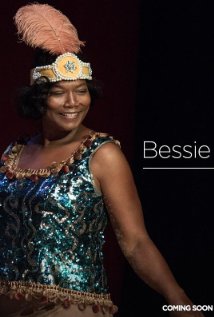
BESSIE
US, 2015, 112 minutes, Colour.
Queen Latifah, Mo' Nique, Michael Kenneth Williams, Mike Epps, Tory Kittles, Tika Sumpter, Bryan Greenberg, Oliver Platt, Khandi Alexander, Charles S.Dutton, Jennifer Sears.
Directed by Dee Rees.
Bessie is a television portrait of the jazz and blues singer of the early 20th century, Bessie Smith.
Queen Latifah is in her element as Bessie Smith, a big and strong character, direct and blunt, strong and her relationships, clashing with her sister, one of her brothers as her manager. It also shows her beginnings, her talent in singing, opportunities to go on stage, the interaction with Ma Rainy (an impressive performance by Mo’ Nique), an interview with her, her being accepted and becoming part of the act. The beginnings were in the second decade of the 20th century.
When she had become a significant show business person, and getting her own train to tour the country, as had Ma Rainy, she makes a very strong impression on audiences, the African- American men and women enjoying her songs, the lyrics and, especially, the rhythms. She is able to stand up for herself – an interesting experience when performing in a large marquee and a threat from the Ku Klux Klan and her routing them.
The film shows her relationships, with both men and women, the proposal from a manager, Jack Gee (Michael Kenneth Williams), whom she marries, and lets him manage her career, even to persuade her, cajole her, to make recordings. While he has a wandering eye, so did she, beginning a liaison with the bootlegger, Richard (Mike Epps) with whom she has a partnership until her death in a car accident.
Entrepreneur John Hammond encourages her and fosters her recordings, giving her popularity again after a decline at the beginning of the Depression.
The film is both a portrait and a tribute – warts and all.
1. Bessie Smith? Audience knowledge? Americans, African- Americans? World audiences?
2. The film as a television biopic? A portrait, warts and all?
3. A tribute, to Bessie Smith as an entertainment, music and singing, breakthrough with African- American audiences? Civil Rights?
4. Queen Latifah, her strong presence, impersonation of Bessie Smith, songs and music? Stage performances?
5. Her biography, her origins, the 19th century, into the early 20th century, memories of herself as a child, the locked cabinet? Viola, her brothers, memories of her mother, the boys running away, Clarence becoming a manager, the family becoming dependent on her as she became more famous and wealthy?
6. Bessie, the singing, the talent, auditions, Ma Rainy, the train, the challenge? Accepted, her ability? The tours, the management, the audiences, jazz and blues? The success, going out by herself, wanting her own train, ambitions, getting the train and enjoying it, touring America? Ma Rainy and her response?
7. Bessie and her relationships, with women, with men, open? Ma and her relationships, women?
8. Bessie as a strong woman, blunt, direct?
9. Bessie’s success, the range of songs throughout the film, the audiences and their applause? Sharing the music, the rhythms? The confrontations? The tent episode, her defying the Klan? The audience cheering?
10. Jack Gee, his personality, approaching Bessie, the proposal, acceptance, their experience, life together, work? Other relationships? His bringing in his girlfriend? Bessie ousting her?
11. Clarence, rather more timid, less forceful than Jack? The discussions about recordings?
12. The family, buying the mansion, the wealth, everybody coming to the house, Jack and his reaction? Their dependence? The sudden adoption of the boy, an orphan, bringing him home, Jack’s reaction, the bonding with Jack? His taking the boy with him when he left, S his grief, drinking, the collapse?
13. Recordings, the requests, her refusal? The various labels, Jack and his persuasion, the studio, the deals, her singing into the microphone, a tantrum, recording?
14. Further success, Columbia records? The touring, in the south, in New York City, the fashionable white crowd and her telling them off?
15. The Depression, losing bookings, less popularity? Yet her striving, John Hammond, his recognition of her talent, his promoting her? Her comeback and success?
16. Relationship with Richard, his bootlegging, the sexual companionship? His return, stopping the bootlegging, staying together?
17. The suddenness of her death? The achievement? Place in American culture, African- American culture?
Published in Movie Reviews
Published in
Movie Reviews
Tagged under
Saturday, 18 September 2021 19:56
Abduction Club, The
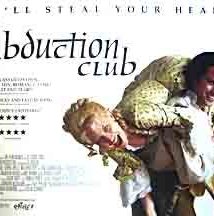
THE ABDUCTION CLUB
2002, UK/Ireland, 96 minutes, Colour.
Alice Evans, Daniel Lapaine, Sophia Myles, Matthew Rhys, Liam Cunningham, Edward Woodward, Patrick Malahide.
Directed by Stefan Schwartz.
The Abduction Club is an 18th century romp. This kind of film was popular in the late '50s and early '60s with films like The Gypsy and the Gentleman and culminating in the success of Tom Jones. However, it also is a throwback to the glossy costume melodramas of the Gainsborough Studios of the early '40s, The Man in Grey, Fanny by Gaslight.
The setting is County Waterford in 1780. The focus is on the aristocracy, especially the young women who are eligible for marriage with their fortunes for dowries. It also focuses on the impoverished young men of Irish aristocratic families. Their solution to their problem is to abduct the women of their hearts' desires. As the film shows, many happy marriages are formed in this way rather than the cold and arranged marriages that wealthy parents desire.
The film is robust in its presentation of the young men and especially the two sisters who are abducted. It also shows some of the politics of the time, the English repression of the Irish, the tough people who went from Ireland to the Americas.
Daniel Lapaine (Muriel's Wedding) and Matthew Rhys (Titus, Very Annie Mary) are the two central young men who abduct the two sisters who are played with verve by Alice Evans and Sophia Myles. In support are the character actors Liam Cunningham as a vengeful wealthy man who wants to marry the younger sister, Edward Woodward as Lord Fermoy, the authority from Dublin, and Patrick Malahide as Sir Miles, the patron of the abduction club.
It is all very colourful, slight, a glimpse into an aspect of Irish history to be enjoyed rather than to be pondered seriously.
1. The Irish setting? The 18th century? Re-creation of the period, costumes, decor, manners?
2. Irish society, the wealthy, the poor, prospects for prosperity? The choices for the younger sons of aristocratic families, priesthood or marrying into a wealthy family?
3. The tone of the film, the touch of the rollicking? Human? Serious?
4. The Abduction Club, the patron and his advocating of behaviour? His character?
5. The authorities, the significance of the Lord, overseeing situations, the touch of the permissive?
6. Garrett and James, younger sons, their prospects, their decisions? The decision to marry? Their personalities, charm, the touch of the reckless?
7. The Kennedy girls, the decision to abduct Catherine? Garrett, his love? Catherine, her personality, her family and place? Her being unwilling to go? Wanting to return home? The contrast with Anne, younger, eager to be away? The relationship with James?
8. The abduction itself, the manner, leaving the village, keeping the girls? The interactions over the time, Catherine and her change of heart, Garrett and his attitude, James and Anne, falling in love?
9. Mr Power, his character, older, a suitor for Catherine, his pursuit of Catherine, his soldiers, taking them to confront the young men?
10. The resolution, the return home, marriages? Abduction sometimes being more effective than arranged marriages?
11. The comic touches, the men and the touches of the Irish rake, yet the serious issues for Irish society at the time?
Published in Movie Reviews
Published in
Movie Reviews
Tagged under